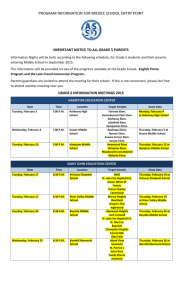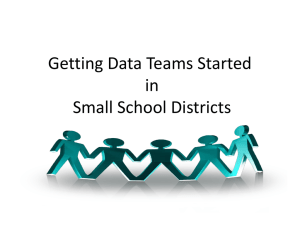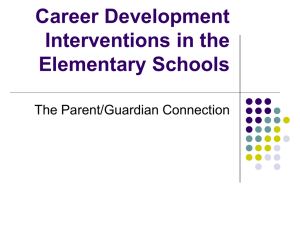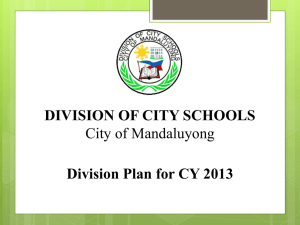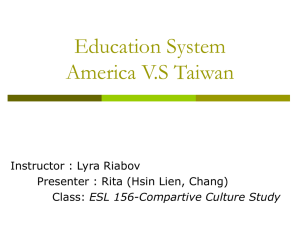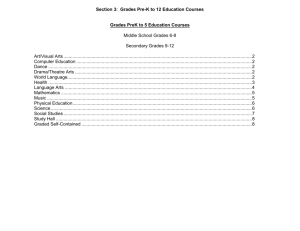in Elementary Education - East Carolina University
advertisement
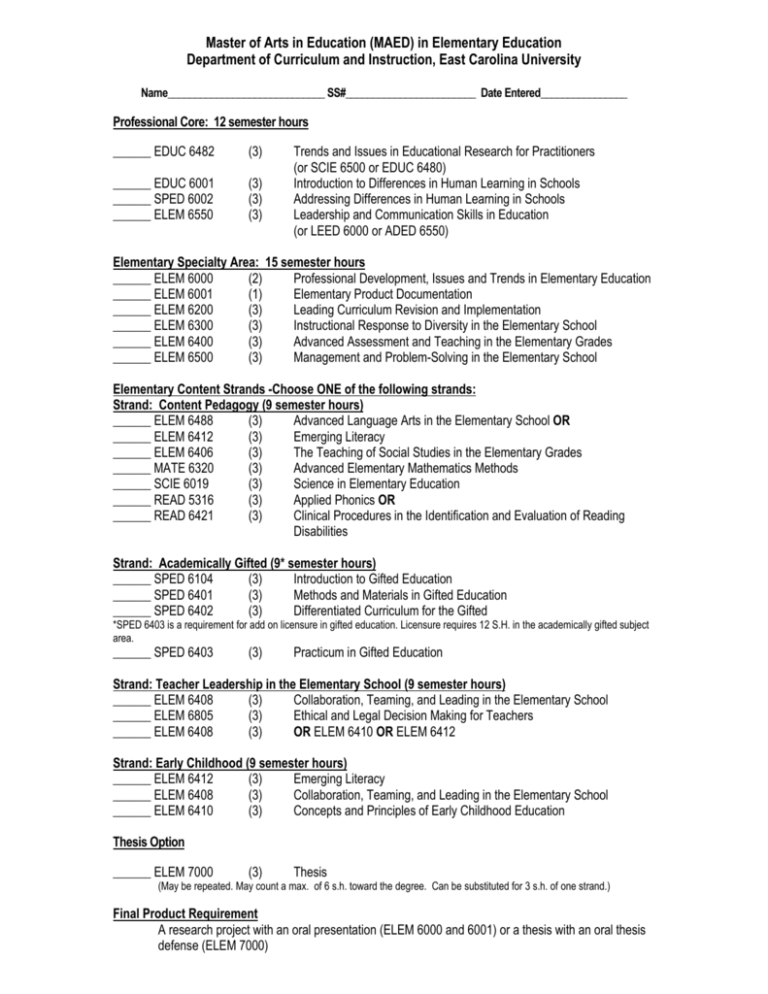
Master of Arts in Education (MAED) in Elementary Education Department of Curriculum and Instruction, East Carolina University Name_____________________________ SS#________________________ Date Entered________________ Professional Core: 12 semester hours ______ EDUC 6482 (3) ______ EDUC 6001 ______ SPED 6002 ______ ELEM 6550 (3) (3) (3) Trends and Issues in Educational Research for Practitioners (or SCIE 6500 or EDUC 6480) Introduction to Differences in Human Learning in Schools Addressing Differences in Human Learning in Schools Leadership and Communication Skills in Education (or LEED 6000 or ADED 6550) Elementary Specialty Area: 15 semester hours ______ ELEM 6000 (2) Professional Development, Issues and Trends in Elementary Education ______ ELEM 6001 (1) Elementary Product Documentation ______ ELEM 6200 (3) Leading Curriculum Revision and Implementation ______ ELEM 6300 (3) Instructional Response to Diversity in the Elementary School ______ ELEM 6400 (3) Advanced Assessment and Teaching in the Elementary Grades ______ ELEM 6500 (3) Management and Problem-Solving in the Elementary School Elementary Content Strands -Choose ONE of the following strands: Strand: Content Pedagogy (9 semester hours) ______ ELEM 6488 (3) Advanced Language Arts in the Elementary School OR ______ ELEM 6412 (3) Emerging Literacy ______ ELEM 6406 (3) The Teaching of Social Studies in the Elementary Grades ______ MATE 6320 (3) Advanced Elementary Mathematics Methods ______ SCIE 6019 (3) Science in Elementary Education ______ READ 5316 (3) Applied Phonics OR ______ READ 6421 (3) Clinical Procedures in the Identification and Evaluation of Reading Disabilities Strand: Academically Gifted (9* semester hours) ______ SPED 6104 (3) Introduction to Gifted Education ______ SPED 6401 (3) Methods and Materials in Gifted Education ______ SPED 6402 (3) Differentiated Curriculum for the Gifted *SPED 6403 is a requirement for add on licensure in gifted education. Licensure requires 12 S.H. in the academically gifted subject area. ______ SPED 6403 (3) Practicum in Gifted Education Strand: Teacher Leadership in the Elementary School (9 semester hours) ______ ELEM 6408 (3) Collaboration, Teaming, and Leading in the Elementary School ______ ELEM 6805 (3) Ethical and Legal Decision Making for Teachers ______ ELEM 6408 (3) OR ELEM 6410 OR ELEM 6412 Strand: Early Childhood (9 semester hours) ______ ELEM 6412 (3) Emerging Literacy ______ ELEM 6408 (3) Collaboration, Teaming, and Leading in the Elementary School ______ ELEM 6410 (3) Concepts and Principles of Early Childhood Education Thesis Option ______ ELEM 7000 (3) Thesis (May be repeated. May count a max. of 6 s.h. toward the degree. Can be substituted for 3 s.h. of one strand.) Final Product Requirement A research project with an oral presentation (ELEM 6000 and 6001) or a thesis with an oral thesis defense (ELEM 7000) MAED ELEM Program Goals By the end of the program a successful graduate will be able to: 1. Improve instructional effectiveness, student achievement and student learning through… a. reading educational literature critically, including theoretical, philosophical and research materials, b. analyzing and articulating relationships between and among theory, philosophy, research findings, and current practice, c. designing and modifying instruction based on well articulated theory, philosophy, educational research, and best practice, and d. incorporating findings from educational literature into school and classroom strategies to improve student learning. 2. Develop effective communication for collaborative leadership through… a. initiating professional inquiry through reading, dialogue, professional development and action research, b. seeking, evaluating and applying well-grounded suggestions for improvement provided by educators, parents, students, and community leaders, and c. participating in collaborative leadership and mentorship activities to solve educational problems at the levels of classroom, school building, school system, and community. 3. Respond effectively to the diverse needs of students in inclusive classroom setting through… a. designing and modifying instruction that is responsive to differences among learners that are influenced by development, exceptionalities, and diversity, b. actively seeking to increase understanding of and respect for differences in students’ development, exceptionalities and diversity, c. creating a classroom environment in which all learners feel welcome and can be successful, d. reflecting on, diagnosing, and prescribing instruction that fosters student learning, e. understanding and linking subject matter and students’ developmental and diverse needs in context of school settings, f. planning, implementing, and evaluating instruction that reflects intellectual rigor and depth of knowledge in both subject matter disciplines and students’ diverse learning needs, and g. understanding and respecting differences between the learning behaviors and outcomes expected in diverse communities. 4. Expand the depth and breadth of specific teaching areas and linking of this knowledge to learners through… a. demonstrating knowledge in content areas, b. assisting students in the acquisition of knowledge appropriate for their developmental level, c. assisting students in making sense of their own learning through connecting teaching area content knowledge and students’ personal lives, d. supporting students’ learning through the effective use of technology, and, e. assisting students in development competencies that cross content curriculum areas. 5. Demonstrate the act and art of teaching in public school classrooms. The specific goals for the teaching area of elementary are: By the end of the program a successful elementary education graduate will be able to: 6. Effectively implement the goals and objectives of the core (items #1-5 above), specifically in elementary schools with elementary students, 7. Demonstrate advanced understandings and implementation of elementary curriculum content and methods of teaching in elementary classrooms, 8. Reflect on and evaluate one’s own elementary classroom practices and experiences, 9. Demonstrate mastery level teaching through documented expertise in the design and delivery of instruction for elementary education students, with the use of appropriate technology and presentation methods for both instruction and documentation of teaching expertise, and 10. Demonstrate the ability to locate, interpret, evaluate, and utilize relevant educational research to address school-related issues in the elementary school as well as design and implement action research focused on school-based issues.
